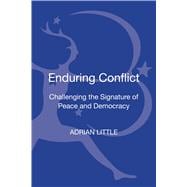This unique text challenges the notion that absence of conflict is the foundation and norm of a stable political environment. Combining complexity theory and the notion of signature with case studies, it argues that political processes need to be understood within their social and cultural contexts. It thus develops the idea of enduring conflict, referring to both the enduring nature of political conflict and the endurance of people in conflict-ridden societies, looking at countries involved in conflict transformation, such as Northern Ireland, Cambodia, Indonesia, and South Africa. Examining debates around trauma, memory, and reconciliation, the work shows how conflicts are so socially and culturally ingrained and protracted that political agreements alone cannot bring substantive change. In addition, key texts, such as peace agreements, along with interviews of politicians, participants, and NGOs help identify the conditions under which notions like peace, democracy, and conflict resolution can even be conceived - let alone implemented.
This innovative text is a significant contribution to the literature as it highlights the limitations of conflict resolution strategies and identifies the issues that pertain to conflicts throughout global politics. Written in an accessible manner, it will be highly attractive to students in conflict processes, peace studies, and international relations theory.









